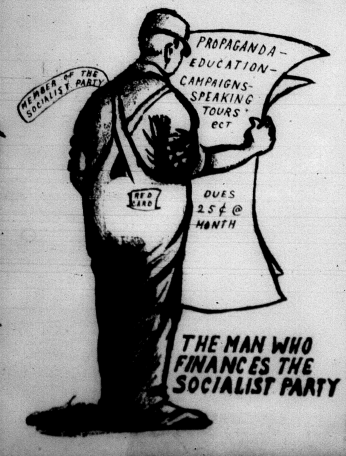The following article was first published in the Milwaukee Socialist Party Publication Political Action October 14, 1911. The party was at the height of its influence, nearly 100,000 members strong, deeply connected with the epochal union battles of the day, and polling around 1 million votes nationally (at a time when the US population was just over 90 million, or roughly one-fourth of today’s population). Though over a century has passed since the article was penned, the author presents a timeless case for why the dues paying model of organization is important, especially relevant as we strive to strengthen working-class organizations like DSA today.
The transcript has been lightly edited for clarity and brevity—Editors
The Socialist Party is a party of, by and for the workers and those who are in sympathy with a working class political program. The workers as a class, must emancipate themselves from economic slavery. They must develop and support both an economic and a political movement for the achievement of this great purpose.
The Socialist Party in its worldwide struggle for governmental power has demonstrated the fact that the workers cannot trust to philanthropists, voluntary contributions, or to luck for finances, neither may it rely upon haphazard donations for revenue; and above all, democratic control must be the keynote of the organization.
This being the case, a membership dues paying system was established. The Socialist Party relies first, last, and all the time upon the working class for both political and financial support.
Usual Objections to the Dues System Answered.
OBJECTION: “No other party has such a system of financing its work.”
ANSWER: No other party offers the lay member a voice and vote in the management of its business, control of its officials, local, state and national, the making of its platforms and laws
The men and women who pay the bills will see to it that the Socialist Party represents the demands of the majority – you may depend upon that.
OBJECTION: “The dues system humiliates impoverished members and those who otherwise would become members.”
ANSWER: The above objection has no weight in face of the fact that national, state and local organizations of the party provide for such applicants being admitted to full privileges of membership without payment of dues. And as poverty is the legitimate child of labor exploitation, it cannot be counted a disgrace under capitalism. The first purpose of the Party is to destroy a system that forces the “humiliation of poverty” upon more and more of the world’s workers each year.
OBJECTION: “The dues-paying system places the dollar above the man.”
ANSWER: Aside from the Socialist Party, and the organizations of the workers which seek to wrest a larger share of the products of their toil from the masters of the industrial world, the dollar is above the man in every relation of life in the modern state.
We emphasize the fact that all are welcome to our ranks regardless of their financial condition, but very properly insist that all who can do so shall contribute regularly to the necessary and unavoidable expenses of the workers’ international movement.
OBJECTION: “The dues-paying system is un-American.”
ANSWER: It certainly is, if your idea of Americanism may be summed up in the activities of any or all of the political parties in the United States, now opposed to socialism.
They all depend upon “slush funds,” “fried fat,” contributions of office-seekers and small grafters for funds with which to prosecute their campaigns and keep up party organizations.
In these old parties “paternalism” is carried to the extreme, and a handful of men dominate each.
Whatever your political affiliation may be, if you are not a supporter of the Socialist program, you know that practically all the money with which your political machine is run comes from the big rent takers and profit mongers at the head of our law-defying corporations.
On the other hand, the Socialist Party at all times relies upon the financial support of its membership in its fights against wage-slavery. Not alone in campaigns but every day in the year its organization is being pushed into new communities, its propaganda strengthened, and the great lesson of democratic control of political activities is being brought home to the people. This constant propaganda entails a constant expense and requires a modern system of organization. These demands are met and satisfied through the operation of the dues system, without working a hardship upon any one of the thousands of comrades who are organized for the overthrow of capitalism.
The Principles of the Dues-Paying System
The following summary will serve to show the necessity for the dues system in our organization.
1. It is a systematic, simple, and equitable method of financing the movement, and is in use the world over, both in our party and in the great labor organizations.
2. Through the dues system, local, state and national organizations are enabled to enforce a probationary period of membership in the party before a member is eligible for office either within the party or upon its ticket at public elections. This is a valuable protection against an influx of mere office-seekers, especially in localities where the party has developed considerable strength.
3. The dues system guarantees that only those endorsed by the party membership may appear unchallenged before the public as representatives of the Socialist Party. Without the dues system in force any one might mount the platform and teach any old thing he pleased and declare it the last word of the Socialist Party. The dues system is the sure safeguard against trickery, compromise, and political trading.
The betrayal of the people by political parties, past and present, has been directly related and proportioned to the services the party rendered to the services the party rendered to the few individuals who financed it and who consequently became its masters and owners. The only safeguard for the workers in politics lies in a democratically controlled party organization fortified behind the membership dues system.
Conclusion
We must not forget that we are living under the capitalist system and that, pending its abolition, the Socialist Party must do a large amount of educational work among the masses. This being true, it follows that the rank and file must support this work financially. The emancipation of the working class must rest with the working class, who alone can keep this great movement true to its purpose.
We want to hear from you. Do you have a workplace story or editorial you’d like to share with us? Email us at redfault@austindsa.org!

